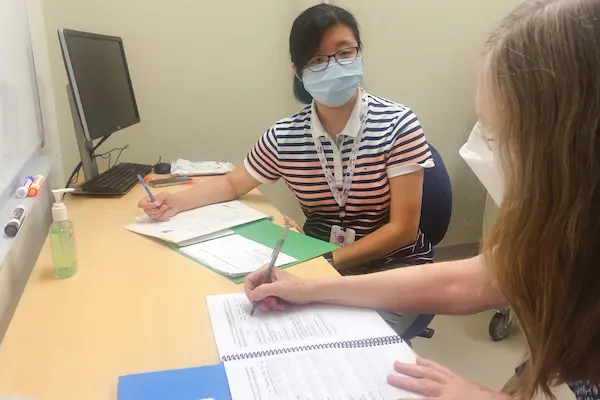Research Supported by a $4M Grant from National Institute of Aging

09/29/2022
By Karen Angelo
About 36 million older adults fall each year, making it the leading cause of injury and death among people ages 65 and older, according to the Centers for Disease Control. Falls, however, are preventable – and they’re not an inevitable part of aging.
Individual strategies for reducing falls include increasing activity, building strength and reviewing medications with physicians. But another factor may play a role in the risk for falls: where an individual lives. At present, little is known about how different types of communities – urban, suburban and rural – affect overall health and the risks of falling.
A new study led by Prof. of Public Health Wenjun Li, with funding from a $4 million, five-year grant from the National Institute on Aging, will analyze how older people move and use the outdoor space in their communities.
“Our study will produce new research results that will inform cities, towns and organizations on strategies that promote active aging and fall prevention, right down to the neighborhood level,” says Li. “Since older adults have more physical limitations and no longer travel outside neighborhoods to work, it’s critical that we understand how community resources near home promote or limit health and well-being.”
Li and his research team are recruiting 1,200 people 65 years and older who live in central and northeastern Massachusetts, including the counties of Worcester, Middlesex and Essex, for the Healthy Aging and Neighborhood study. Those who participate will complete surveys and wear devices that measure physical activity and track outdoor movement. Researchers will follow up every six months for three years to track falls, mobility, activity patterns, disability, health and behavior.
Li’s previous research found that the living environment plays an important role in the likelihood of engaging in healthy behaviors, having chronic conditions and being injured or disabled. For example, access to nearby public parks and recreational areas provides walking opportunities and social activities for those who no longer drive. However, people who live in rural areas most likely can’t walk to such places and need other ways to stay active.
This new study goes further by collecting data on the actual time, place and type of activities people do and analyzing the conditions when falls occur, in urban, suburban and rural areas. The research team will compare variables such as gender, race, and activity intensity and frequency.
This project provides many opportunities for student participation in research and experiential learning. “Federally funded research projects are vital to expanding advanced learning beyond classrooms, creating an intellectually vibrant campus,” says Li. “Such projects can inspire students to aim higher and pursue a career in both academia and research.”
Public health doctoral student Lingming Chen, who graduated from the Master of Public Health program in 2021, is recruiting people for the study, translating information for participants and preparing presentations for community engagement.
“When I was doing my master’s thesis, I found epidemiology concentration very interesting and am happy to continue working with Prof. Li on this project as I pursue my Sc.D. in public health,” says Chen. “Our society is aging, and we need this data to create solutions that will be evidence-based.”
Olivia Briggs, a Master of Public Health student, was intrigued to help find evidence-based solutions that can prevent falls.
“Having worked as an EMT and seen the devastating effects of seniors falling, I was interested in this research study aimed at learning more about the factors that cause seniors to be at increased risk for falls,” says Briggs. “By working on this project, I am gaining experience in community outreach and participant recruitment, data collection, working with enrolled participants and doing data quality checks. Our team constantly works together to brainstorm ideas and solve problems.”
Research Project Director Qun (Rachel) Le conducts field work, engages with the community to recruit participants and conducts interviews in English and Chinese.
“As a registered nurse who has conducted research in the past, I have a strong passion for this research related to physical activity and health-related outcomes among older adults,” she says.
If you are 65 years or older and would like to participate in this study, contact researchers at the UMass Lowell Healthy Aging and Neighborhood Study by emailing HANS@uml.edu or calling 978-934-2990.
